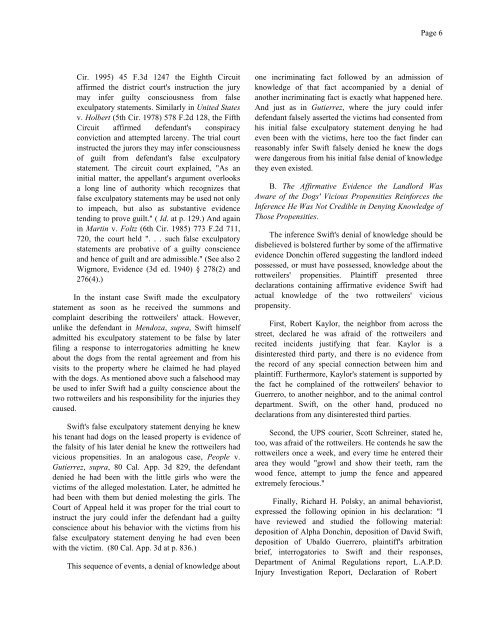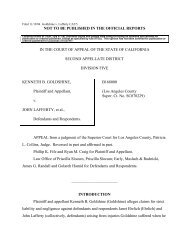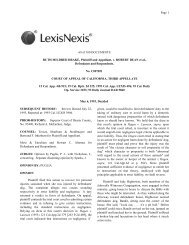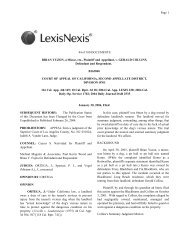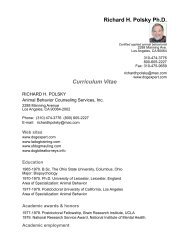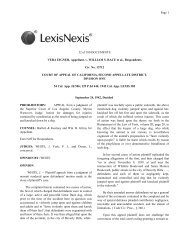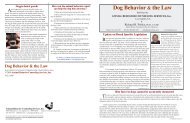Donchin v. Guerrero - Animal behavior dog bite expert witness
Donchin v. Guerrero - Animal behavior dog bite expert witness
Donchin v. Guerrero - Animal behavior dog bite expert witness
Create successful ePaper yourself
Turn your PDF publications into a flip-book with our unique Google optimized e-Paper software.
Page 6<br />
Cir. 1995) 45 F.3d 1247 the Eighth Circuit<br />
affirmed the district court's instruction the jury<br />
may infer guilty consciousness from false<br />
exculpatory statements. Similarly in United States<br />
v. Holbert (5th Cir. 1978) 578 F.2d 128, the Fifth<br />
Circuit affirmed defendant's conspiracy<br />
conviction and attempted larceny. The trial court<br />
instructed the jurors they may infer consciousness<br />
of guilt from defendant's false exculpatory<br />
statement. The circuit court explained, "As an<br />
initial matter, the appellant's argument overlooks<br />
a long line of authority which recognizes that<br />
false exculpatory statements may be used not only<br />
to impeach, but also as substantive evidence<br />
tending to prove guilt." ( Id. at p. 129.) And again<br />
in Martin v. Foltz (6th Cir. 1985) 773 F.2d 711,<br />
720, the court held ". . . such false exculpatory<br />
statements are probative of a guilty conscience<br />
and hence of guilt and are admissible." (See also 2<br />
Wigmore, Evidence (3d ed. 1940) § 278(2) and<br />
276(4).)<br />
In the instant case Swift made the exculpatory<br />
statement as soon as he received the summons and<br />
complaint describing the rottweilers' attack. However,<br />
unlike the defendant in Mendoza, supra, Swift himself<br />
admitted his exculpatory statement to be false by later<br />
filing a response to interrogatories admitting he knew<br />
about the <strong>dog</strong>s from the rental agreement and from his<br />
visits to the property where he claimed he had played<br />
with the <strong>dog</strong>s. As mentioned above such a falsehood may<br />
be used to infer Swift had a guilty conscience about the<br />
two rottweilers and his responsibility for the injuries they<br />
caused.<br />
Swift's false exculpatory statement denying he knew<br />
his tenant had <strong>dog</strong>s on the leased property is evidence of<br />
the falsity of his later denial he knew the rottweilers had<br />
vicious propensities. In an analogous case, People v.<br />
Gutierrez, supra, 80 Cal. App. 3d 829, the defendant<br />
denied he had been with the little girls who were the<br />
victims of the alleged molestation. Later, he admitted he<br />
had been with them but denied molesting the girls. The<br />
Court of Appeal held it was proper for the trial court to<br />
instruct the jury could infer the defendant had a guilty<br />
conscience about his <strong>behavior</strong> with the victims from his<br />
false exculpatory statement denying he had even been<br />
with the victim. (80 Cal. App. 3d at p. 836.)<br />
This sequence of events, a denial of knowledge about<br />
one incriminating fact followed by an admission of<br />
knowledge of that fact accompanied by a denial of<br />
another incriminating fact is exactly what happened here.<br />
And just as in Gutierrez, where the jury could infer<br />
defendant falsely asserted the victims had consented from<br />
his initial false exculpatory statement denying he had<br />
even been with the victims, here too the fact finder can<br />
reasonably infer Swift falsely denied he knew the <strong>dog</strong>s<br />
were dangerous from his initial false denial of knowledge<br />
they even existed.<br />
B. The Affirmative Evidence the Landlord Was<br />
Aware of the Dogs' Vicious Propensities Reinforces the<br />
Inference He Was Not Credible in Denying Knowledge of<br />
Those Propensities.<br />
The inference Swift's denial of knowledge should be<br />
disbelieved is bolstered further by some of the affirmative<br />
evidence <strong>Donchin</strong> offered suggesting the landlord indeed<br />
possessed, or must have possessed, knowledge about the<br />
rottweilers' propensities. Plaintiff presented three<br />
declarations containing affirmative evidence Swift had<br />
actual knowledge of the two rottweilers' vicious<br />
propensity.<br />
First, Robert Kaylor, the neighbor from across the<br />
street, declared he was afraid of the rottweilers and<br />
recited incidents justifying that fear. Kaylor is a<br />
disinterested third party, and there is no evidence from<br />
the record of any special connection between him and<br />
plaintiff. Furthermore, Kaylor's statement is supported by<br />
the fact he complained of the rottweilers' <strong>behavior</strong> to<br />
<strong>Guerrero</strong>, to another neighbor, and to the animal control<br />
department. Swift, on the other hand, produced no<br />
declarations from any disinterested third parties.<br />
Second, the UPS courier, Scott Schreiner, stated he,<br />
too, was afraid of the rottweilers. He contends he saw the<br />
rottweilers once a week, and every time he entered their<br />
area they would "growl and show their teeth, ram the<br />
wood fence, attempt to jump the fence and appeared<br />
extremely ferocious."<br />
Finally, Richard H. Polsky, an animal <strong>behavior</strong>ist,<br />
expressed the following opinion in his declaration: "I<br />
have reviewed and studied the following material:<br />
deposition of Alpha <strong>Donchin</strong>, deposition of David Swift,<br />
deposition of Ubaldo <strong>Guerrero</strong>, plaintiff's arbitration<br />
brief, interrogatories to Swift and their responses,<br />
Department of <strong>Animal</strong> Regulations report, L.A.P.D.<br />
Injury Investigation Report, Declaration of Robert


